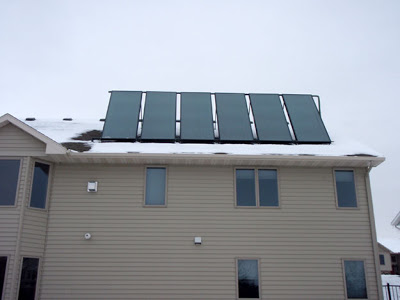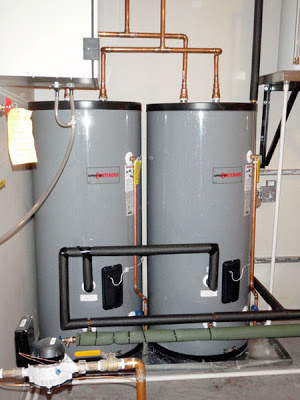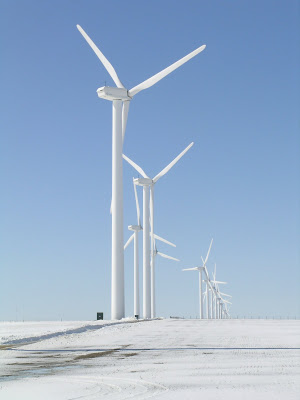by jboullion | Feb 13, 2009 | Uncategorized
From an article by Tom Content in the Milwaukee Journal Sentinel:
More companies are looking to reduce their energy and water utility bills by taking steps to make their processes more efficient.
It’s all about adapting the quality-improvement techniques that many companies are already using, said Joseph Jacobsen, associate dean at Milwaukee Area Technical College.
What’s making people turn to green? Businesses know that carbon regulations are coming and want to get ready, and they are realizing that saving energy and water helps save – or stem the rise – in utility bills.
“Green is not just environmental sustainability. Green is business sustainability too,” said Jon Dommissee, director of new product development and marketing at Bradley Corp.
Jacobsen and Dommissee spoke during a Green Manufacturing Summit held Thursday at the Schlitz Audubon Nature Center in Bayside. Bradley, a local maker of plumbing fixtures, and the state Focus on Energy sponsored the event, along with the Journal Sentinel.
Despite the slowing economy, companies continue to seek grants from Focus on Energy to help them pay for energy-saving projects, said Nate Altfeather of Focus.
Focus provides grants that help shorten the payback time on projects that boost energy efficiency. With companies holding the line on spending, the types of incentives sought from Focus may shift.
“We’re going to see a lot more interest in low and no-cost maintenance incentives,” Altfeather said. “People aren’t going to be able to cut checks for $100,000 for new equipment.”
Focus is developing new incentives designed to help companies with energy-saving upgrades that have a payback of one year or less. The Focus program, funded through charges on utility bills, will pay nearly 100% of an energy audit for those firms, Altfeather said.
by jboullion | Feb 13, 2009 | Uncategorized
From a new release posted on WQOW-TV, Eau Claire:
Eau Claire (News Release) – With the Wisconsin Department of Transportation in Eau Claire today to receive public comment on its “Connections 2030” long-range transportation plan, the West Central Wisconsin Rail Coalition is seeking changes to the plan that would include the region in WisDOT’s plans for a high speed rail network.
Members of the coalition applaud much of the philosophy of the draft Connections 2030 plan, which includes a major state policy goal to provide Wisconsin citizens with more transportation choice by improving passenger train service and other non-automobile travel options. In the draft plan, WisDOT says it “envisions a 21st century intercity passenger rail system that links the Midwest region’s major economic centers.”
Unfortunately, West Central Wisconsin is not included in that network, which would be built in three phases with routes serving Chicago-Milwaukee-Madison-La Crosse-St. Paul and Milwaukee-Green Bay. The plan only promises to “consider” service to area once the entire network is completed more than a decade from now.
The Coalition points out that West Central Wisconsin – which encompasses the Chippewa Valley and St. Croix Valley areas from Eau Claire/Chippewa Falls through Menomonie and Hudson/River Falls – is one of the fastest growing population areas in the state, growth that could be stunted if the area is left out of the network.
by jboullion | Feb 12, 2009 | Uncategorized
From an article by Craig Reberth in the Telegraph Herald (Dubuque):
CASSVILLE, Wis. — Pending a state Department of Natural Resources air-quality hearing next week and the ensuing public comment period, work should start on converting a Cassville power plant from coal to 100 percent renewable fuel.
In May, DTE Energy Services, of Ann Arbor, Mich., announced it was purchasing the E. J. Stoneman power plant. DTE said it planned to convert the coal-fired plant to burn wood waste, a renewable fuel.
The Stoneman facility was built in 1950. Integrys Energy Services bought the 53-megawatt capacity plant in 1996 from Dairyland Power Cooperative and operated it as a merchant power plant, selling power in the open market. This is DTE Energy’s initial foray into Wisconsin.
Once the air permit is issued, the project will move forward, DTE officials say. The plant probably will be pulled off-line by the end of this month, with demolition and construction to take place during the summer. The plant could be back online as early as June 2010.
Work includes converting the boilers from burning pulverized coal to a stoker technology and conversion of the material handling process. It is estimated the project will use 40 people at the peak of the effort.

by jboullion | Feb 12, 2009 | Uncategorized

From the Web site of Energy Concepts, located in Hudson, Wisconsin:
One hurdle on this project was convincing the sub-division association that the solar panels would not take away from the development’s overall aesthetics and that it complied with existing covenants, which it did.
This is a custom-designed combination domestic hot water and in-floor space heating system.
The homeowners received $2,500 for the project from a Focus on Energy Hot Water Grant and another $3,500 from the Solar Space Heaitng Progam, a program of utility members of WPPI Energy.
Two 119-gallon tanks (below) hold the solar heated water until it circulates under the floors to heat the house.

by jboullion | Feb 11, 2009 | Uncategorized
From an article by David Steinkraus in The Journal Times (Racine):
YORKVILLE — The County Board decided Tuesday to delay its vote on a regional transit authority until its next meeting on Feb. 24, but many citizens showed up in the board chambers to voice their opinions.
Although Kenosha-Racine-Milwaukee commuter rail has been the focus of most comments, the proposal sent to Gov. Jim Doyle is broader than that.
It suggests that the state create a permanent regional transit authority which could be joined by municipalities in southeastern Wisconsin. This permanent RTA would oversee not only a commuter rail project but also integration of the various bus systems, and it would have the authority to replace local property tax support of mass transit with a sales tax of up to 0.5 percent.
The board resolution does not express specific support for the tax but it does ask that any board with taxing authority be elected rather than appointed and that each municipality be allowed to approve or disapprove a transit tax.



